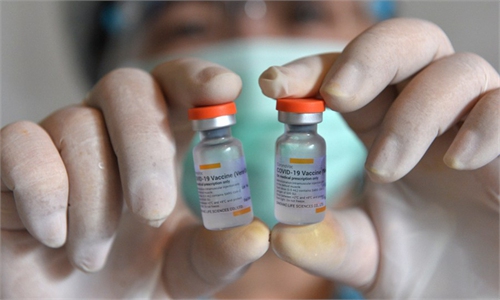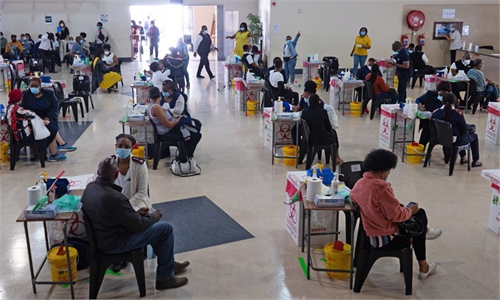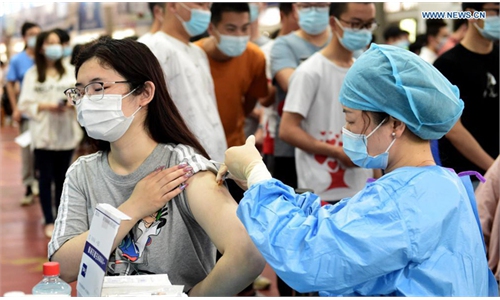China’s push to vaccinate its nationals abroad helps local economies
'Spring sprout' supports local economies, employment: businesses
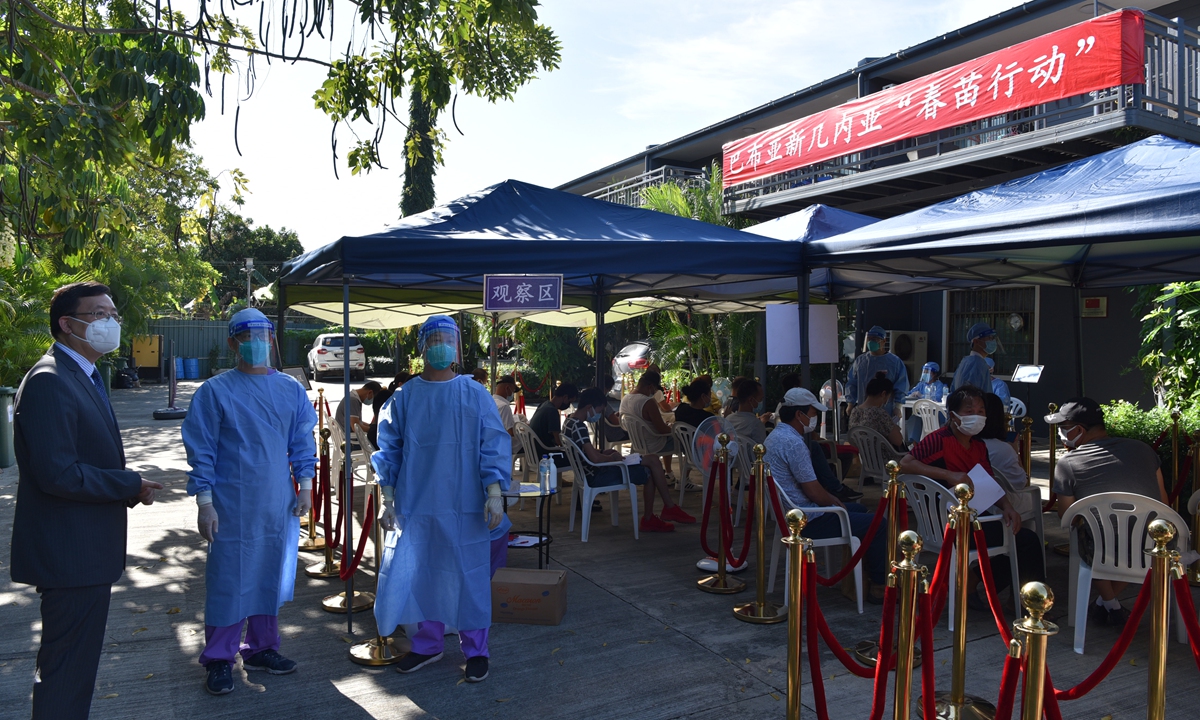
Chinese Ambassador to PNG Zeng Fanhua (left) talks with a Chinese medical aid team at the vaccination site of the "spring sprout" program in PNG Photo: Courtesy of Chinese Embassy in PNG
China's overseas vaccine program, known as the "spring sprout" program, that aims to ensure its nationals across the globe receive vaccines timely, is also supporting China-assisted projects and Chinese firms' operations abroad, some business representatives told the Global Times.
The early resumption of these China-invested firms and industrial zones is also becoming a stabilizer of local employment and production in their host countries, offering hope for the revival of local economies, mostly developing ones, amid COVID-19 flare-ups, observers said.
In Papua New Guinea (PNG), an island country in the Southwestern Pacific, the vaccination campaign has already covered all Chinese-funded enterprises in the capital city Port Moresby, the Chinese Embassy in PNG told the Global Times on Sunday.
About 520 employees from Chinese-funded enterprises in PNG had been vaccinated as of Sunday, said the embassy, noting that in the next step, it plans to take the vaccination campaign to other cities where other Chinese-funded enterprises operate and Chinese nationals live.
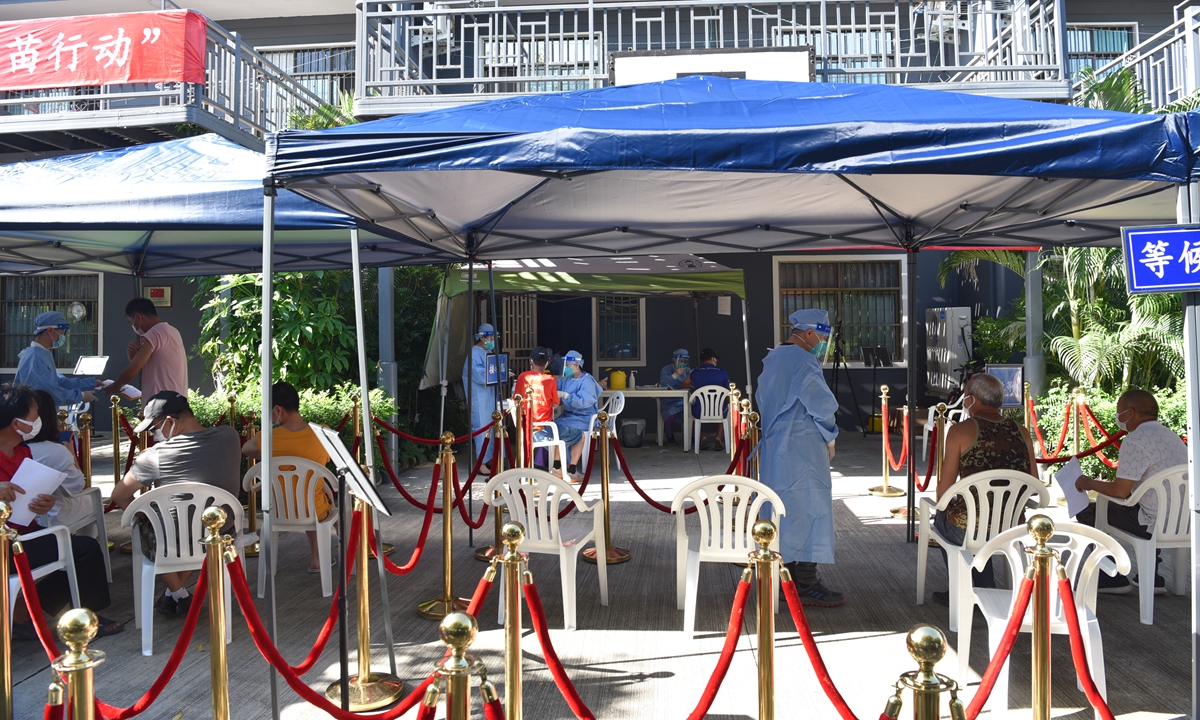
Local Chinese nationals wait for their vaccinations in Papua New Guinea (PNG) under the "spring sprout" program. Photo: Courtesy of Chinese Embassy in PNG
Launched in March this year, the program has entered the fast track powered by the efforts of Chinese diplomatic missions - with over 1.7 million overseas Chinese nationals in more than 160 countries and regions having been inoculated with Chinese or foreign-made vaccines, Foreign Ministry spokesperson Wang Wenbin said during a regular press conference in Beijing on Thursday.
"Through such efforts, we hope to build a strong firewall to protect the safety and health of overseas Chinese nationals," Wang said.
According to some Chinese firms, the program is not only about the safety and health of overseas Chinese, it also ensures Chinese companies' role as a stable source of jobs and income for local residents amid the pandemic woes.
Xu Genluo, senior consultant at the Thai-Chinese Rayong Industrial Park, told the Global Times on Sunday that the implementation of "spring sprout" has bolstered companies and workers in the industrial park, which has 167 companies as tenants with more than 40,000 Thai employees.
According to a document of the industrial park published over the weekend, the implementation of the initiative in Thailand has benefited tens of thousands of Chinese in Thailand. "We felt all of a sudden our spines have been stiffened," read the document.
"With the inoculation and the completion of various epidemic control measures, we believe that we will eventually succeed in the fight against the virus," Xu said. "There have been small-scale outbreaks inside the industrial park but production has not slowed as we try to find a balance between epidemic control and maintaining production. Production has been kept at 100 percent despite the epidemic's disruption."
While maintaining full operation, Chinese companies are also keeping local employees and offering other assistances to them amid the epidemic.
"During the epidemic, we did not fire any employee and helped them to solve the difficulties caused by the epidemic," the East Africa branch of Stecol Corp, a Chinese engineering company, said in a statement it sent to the Global Times on Sunday.
Taking into account that local employees do not have a stable source of income during the epidemic, the firm also paid full wages to some local employees working at home, and it provides monthly living allowances to other employees to stabilize their incomes and help them get over the difficulties.
Observers said that a front-runner recovery of Chinese companies in some major manufacturing countries also offers hope for the rapid recovery of local production and a boost for local economies in the post-epidemic era.
Luthai Textile, a China-based company principally engaged in textile fabrics, said on Saturday that its overseas factory in Vietnam has "basically achieved full production."
The firm operates along the whole textile and garment industry chain, including cotton breeding, spinning and bleaching and dyeing, and it mainly supplies casual fabrics for brands such as Uniqlo and Olympus, according to media reports.
Apart from helping its own nationals get vaccinated as soon as possible, China has also donated more vaccines to developing countries in recent months, despite the huge domestic demand and limited supply.
China has supplied more than 480 million doses of vaccines to the international community, making it the largest supplier of vaccines in the world. As of Friday, China had provided vaccine assistance to nearly 100 countries and regions from five continents, latest official data showed.
"China will continue to contribute to the accessibility and affordability of vaccines in developing countries to the best of its capacity," Wang said.
"We also hope that all countries in the world that are able to do so will act as soon as possible, honor their commitments, and make their due contributions to promoting equitable distribution and application of vaccines for better global anti-epidemic cooperation," he said.


